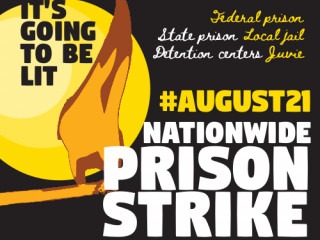 My sister Leslie and I attended the service at Trinity AME Zion Church in Binghamton, NY, on October 9. During the announcements, it was noted that “if you are convicted of a felony and released from prison, you can vote. If you are convicted of a felony, and your sentence is suspended, you can vote. Visit the New York State Board of Elections website to register or re-register to vote.”
My sister Leslie and I attended the service at Trinity AME Zion Church in Binghamton, NY, on October 9. During the announcements, it was noted that “if you are convicted of a felony and released from prison, you can vote. If you are convicted of a felony, and your sentence is suspended, you can vote. Visit the New York State Board of Elections website to register or re-register to vote.”
Read this information from nycourts.gov. “All other criminal convictions do not take away your right to vote. So, misdemeanor and violation convictions do not prevent you from voting even if you are serving time in jail.” The legislation that allowed this was passed in September 2021, yet I managed to miss it.
Moreover, “before being released from prison, you will be notified verbally and in writing by the Department of Corrections and Community Supervision (“DOCCS”) that your voting rights will be returned once you are released. You will also receive a form of application for voter registration and declination form, help filling out the form, and written information on voting. You can submit your forms to the state or county board where you live or have the DOCCS submit it for you.”
I’ve long been frustrated by states who decided that a felony conviction permanently disenfranchised someone. Once someone has “paid their dues,” they should be given the rights of any citizen, if only so they can feel ownership in the society they are returning to.
Voting
In New York State, early voting starts on Saturday, October 29, and runs through Sunday, November 6. One must request an absentee ballot online or by mail by October 24 or in person by November 7. One must return the absentee ballot by November 8.
Poll workers are being sought in NYS for early voting, as well as on Election Day, November 8. And one gets paid! I worked for the general election in 2021.
But does it matter?
My great concern is that there are so many election deniers running for office across the country that the very fabric of our democracy is likely in peril. Their general narrative is “if I win, I won fairly, but if I lose, it was rigged.” This is particularly problematic when these are candidates for governor and secretary of state, who have a hand in certifying the state’s election results.
Other threats to democracy, such as gerrymandering and disinformation, are also problematic. I’ve read stories with the same basic facts; one says the candidate or official is “rattled” or “confused,” whereas another will make no such characterization.
In the NY governor’s race, Alan Singer notes that “MAGA lunacy is not just rampant in the Red States. Republican Party candidate Lee Zeldin is bringing his version” to the Empire State. True enough.
He’s running against the current governor, Kathy Hochul. Frank Robinson calls her the “Worst Candidate I’ll Have Ever Voted For,” and he’s not wrong. He concludes, “At least Hochul’s corruption is merely business-as-usual for New York, not as far down on the vileness scale.”
One of my US Senators, Chuck Schumer (D), is up for reelection. I’ve seen a couple of his warm-and-fuzzy ads. But I have NO IDEA who his Republican opponent is. (Who the heck is Joe Pinion?) There is also a LaRouche party candidate named Diane Sare.
Still, I vote. I ALWAYS vote.

 If “Attica” is just a line you recognize from the movie
If “Attica” is just a line you recognize from the movie  Hmm. The idea of allowing people in prison to vote had never really crossed my mind before recent events.
Hmm. The idea of allowing people in prison to vote had never really crossed my mind before recent events.

